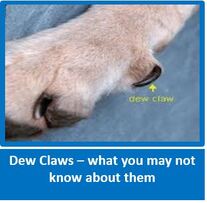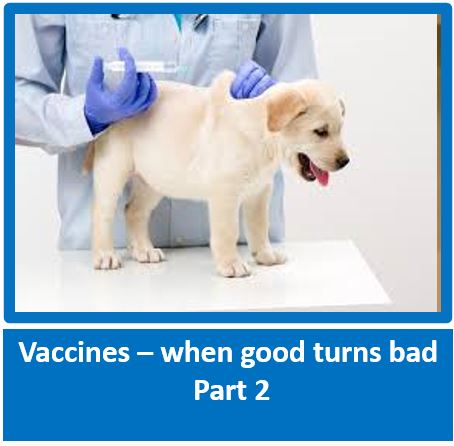
GENRIC Pet Insurance is the most innovative pet insurance product (not a pet medical aid) in SA. It is designed to cover the unexpected, unforeseen, and fortuitous veterinary costs that cats and dogs kept as household pets may incur as a result of illness or injury. Its development took cognisance of the strengths and weaknesses of other policies and therefore avoids their shortcomings from day one. Vet expenses can be very high, especially if any type of operation or specialist care is involved. Ensure that your pet is covered in the event of any unexpected, and unforeseen accidents, any operations
VACCINES: WHEN TOO MUCH OF A GOOD THING TURNS BAD
(Part 1 - there is a link to Part 2 at the bottom)
Dr. Jean Dodds
CONSIDERED ONE OF THE FOREMOST EXPERTS IN PET HEALTHCARE, DR. DODDS FOCUSES ON VACCINATION PROTOCOLS, THYROID ISSUES AND NUTRITION.
VISIT HEMOPET.ORG OR NUTRISCAN.ORG FOR MORE INFORMATION.
(Part 1 - there is a link to Part 2 at the bottom)
Dr. Jean Dodds
CONSIDERED ONE OF THE FOREMOST EXPERTS IN PET HEALTHCARE, DR. DODDS FOCUSES ON VACCINATION PROTOCOLS, THYROID ISSUES AND NUTRITION.
VISIT HEMOPET.ORG OR NUTRISCAN.ORG FOR MORE INFORMATION.

In my book, The Canine Thyroid Epidemic: Answer You Need for Your Dog, I discussed the critical role a properly functioning immune system plays in your dog’s health. If the immune system is weak (immunodeficiency), your pet’s ability to fight off disease is compromised or absent, which can expose them to many infections, including bacterial, viral and fungal infections. Immune deficiency may possibly also reduce the immune system’s ability to recognize and attack cancer-specific antigens. On the other hand, an overly-stimulated immune system can trigger immune-mediated diseases – autoimmune disorders in which the immune system mistakes normal organs as foreign invaders and attacks them. Autoimmune diseases include those affecting many tissues of the body such as the blood, thyroid, adrenal glands, joints, kidneys, liver, bowel, reproductive organs, muscles, nervous system, eyes, skin and mucous membranes.
So, what does this post’s topic – vaccinations – have to do with our pets’ immune systems? Plenty! As a dutiful pet caretaker, you are no doubt vaccinating your pet against a host of diseases. And, of course, a proper vaccination program is essential to your pet’s health. On the other hand, research shows that our pets simply don’t require annual vaccination boosters to keep them protected. In fact, the American Animal Hospital Association’s (AAHA) revised 2011 Canine Vaccination Guidelines recommend a revaccination program every 3 or more years for dogs. And the truth is that once your dog has completed his puppy series (or kitten series for cats) for the core vaccines, there is a good chance his body will maintain immunity to these diseases for life. Yet, many well-intentioned people continue to follow the advice of some veterinarians and give their adult dogs and cats annual (or even semi-annual) vaccine boosters. This can result in over-vaccination and a variety of potentially damaging – and in some cases, even life-threatening – adverse reactions (referred to as “vaccinosis”).
These risks are especially true for pets afflicted with immune-mediated disease, since over-vaccination places undue stress on the immune system and has been linked to autoimmune disease.
Side effects from canine and feline vaccinations can occur anywhere from instantly up to several weeks or months later. Vaccines can even cause susceptibility to chronic diseases later in life.
Mild reactions associated with canine or feline vaccines include:
• Fever
• Malaise
• Urticaria [hives]
• Facial swelling
• Anorexia
• Vomiting
• Stiffness
• Sore joints
• Abdominal tenderness
Severe and fatal adverse events include:
• Susceptibility to infections
• Neurological disorders and encephalitis
• Aberrant behaviour, including unprovoked aggression
• Collapse with autoagglutinated [clumped] red blood cells and icterus [jaundice]; autoimmune hemolytic anemia (AIHA) or the synonym immune-mediated haemolytic anemia (IMHA), when red blood cells are damaged and destroyed; or petechiae [pin-point] and ecchymotic [splotchy] hemorrhages from immune-mediated thrombocytopenia (ITP), when the blood platelets are destroyed. Hepatic enzymes may be markedly elevated, and liver or kidney failure may occur by itself or accompany bone marrow suppression.
In my next post I will discuss the difference between killed vaccines and modified-live vaccines (MLV), the dangers posed by each, and the dog breeds most susceptible to vaccinosis.
But don’t worry, because solutions are on the way! In upcoming posts, I will tell you how you can prevent over-vaccination in your dog or cat by using titer tests instead. Titer tests, which are simple blood tests to check the strength of a dog or cat’s immune defenses to a disease, are the pet owners’ greatest friend. I will discuss how titers work, how they are performed, interpreting the results and the current laws and regulations surrounding them (hint: legally, they can be used as valid proof of protection against all diseases except rabies).
You won’t want to miss these continuing posts on vaccinosis and titer testing, as protecting your pet from unnecessary assaults on their immune systems will help ensure the two of you enjoy many happy, healthy years together.
(From FOTD - there is a lot of different opinions on this topic, and we urge you to do your research, and then to discuss same with your vet, before deciding not to vaccinate annually)
So, what does this post’s topic – vaccinations – have to do with our pets’ immune systems? Plenty! As a dutiful pet caretaker, you are no doubt vaccinating your pet against a host of diseases. And, of course, a proper vaccination program is essential to your pet’s health. On the other hand, research shows that our pets simply don’t require annual vaccination boosters to keep them protected. In fact, the American Animal Hospital Association’s (AAHA) revised 2011 Canine Vaccination Guidelines recommend a revaccination program every 3 or more years for dogs. And the truth is that once your dog has completed his puppy series (or kitten series for cats) for the core vaccines, there is a good chance his body will maintain immunity to these diseases for life. Yet, many well-intentioned people continue to follow the advice of some veterinarians and give their adult dogs and cats annual (or even semi-annual) vaccine boosters. This can result in over-vaccination and a variety of potentially damaging – and in some cases, even life-threatening – adverse reactions (referred to as “vaccinosis”).
These risks are especially true for pets afflicted with immune-mediated disease, since over-vaccination places undue stress on the immune system and has been linked to autoimmune disease.
Side effects from canine and feline vaccinations can occur anywhere from instantly up to several weeks or months later. Vaccines can even cause susceptibility to chronic diseases later in life.
Mild reactions associated with canine or feline vaccines include:
• Fever
• Malaise
• Urticaria [hives]
• Facial swelling
• Anorexia
• Vomiting
• Stiffness
• Sore joints
• Abdominal tenderness
Severe and fatal adverse events include:
• Susceptibility to infections
• Neurological disorders and encephalitis
• Aberrant behaviour, including unprovoked aggression
• Collapse with autoagglutinated [clumped] red blood cells and icterus [jaundice]; autoimmune hemolytic anemia (AIHA) or the synonym immune-mediated haemolytic anemia (IMHA), when red blood cells are damaged and destroyed; or petechiae [pin-point] and ecchymotic [splotchy] hemorrhages from immune-mediated thrombocytopenia (ITP), when the blood platelets are destroyed. Hepatic enzymes may be markedly elevated, and liver or kidney failure may occur by itself or accompany bone marrow suppression.
In my next post I will discuss the difference between killed vaccines and modified-live vaccines (MLV), the dangers posed by each, and the dog breeds most susceptible to vaccinosis.
But don’t worry, because solutions are on the way! In upcoming posts, I will tell you how you can prevent over-vaccination in your dog or cat by using titer tests instead. Titer tests, which are simple blood tests to check the strength of a dog or cat’s immune defenses to a disease, are the pet owners’ greatest friend. I will discuss how titers work, how they are performed, interpreting the results and the current laws and regulations surrounding them (hint: legally, they can be used as valid proof of protection against all diseases except rabies).
You won’t want to miss these continuing posts on vaccinosis and titer testing, as protecting your pet from unnecessary assaults on their immune systems will help ensure the two of you enjoy many happy, healthy years together.
(From FOTD - there is a lot of different opinions on this topic, and we urge you to do your research, and then to discuss same with your vet, before deciding not to vaccinate annually)




